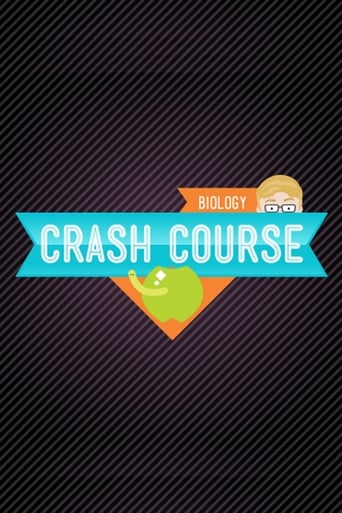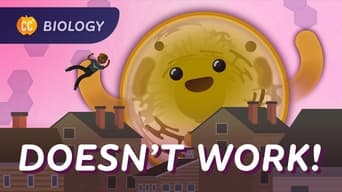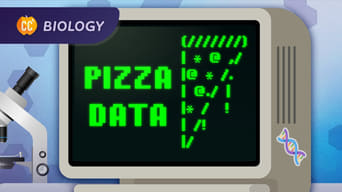

And thus begins the most revolutionary biology course in history. Come and learn about covalent, ionic, and hydrogen bonds. What about electron orbitals, the octet rule, and what does it all have to do with a mad man named Gilbert Lewis? It's all contained within. www.youtube.com/crashcourse

There are countless types of plants and animals on Earth, but how do they work? In this episode of Crash Course Biology, we’ll take a bird’s eye view of how multicellular life functions, including how it’s organized, how it regulates itself to maintain homeostasis, and the big question: Why are these living things so wildly complex?

On its own, a huge DNA sequence is a meaningless pile of data — so, how do biologists figure out what it means? They turn to the power of bioinformatics! In this episode, we’ll learn what bioinformatics is, how it works, and how scientists have used it to better understand everything from evolution to a viral epidemic.

From the flu to COVID-19, viruses are a major threat in our everyday lives. In today’s episode of Crash Course Biology, we’ll learn why viruses are like genes in a box, and how they invade and spread between cells. We’ll also discover how vaccines and medicines help our bodies fight back.

Bacteria often get a bad rap, but they’re some of our best partners in science and medicine! In this episode, we’ll explore what bacteria are doing with their DNA — including how they can trade it around. We’ll learn about chromosomes and plasmids, gene expression and recombinant DNA, and how E. coli are used to make insulin.

Science fiction is full of superpowered mutants, but in reality, mutations are much more diverse and complex. Sometimes, they can change someone’s entire body, and other times, we don’t notice them at all! In this episode, we’ll unpack what mutations are, how they work (including substitutions and frameshift mutations), and how scientists are learning to control mutations using tools like CRISPR/Cas9 and gene therapy.

If nearly all your cells have the same DNA, why are muscle cells so different from skin cells? In this episode, we’ll learn how gene expression is regulated in eukaryotes, and how methylating DNA, modifying histones, and messing with translation not only leads to different types of cells, but allows cells to adapt to the world around them.

We don't have an overview of this episode, please check back later.

We don't have an overview of this episode, please check back later.

We don't have an overview of this episode, please check back later.

We don't have an overview of this episode, please check back later.

We don't have an overview of this episode, please check back later.

We don't have an overview of this episode, please check back later.

We don't have an overview of this episode, please check back later.

We don't have an overview of this episode, please check back later.

We don't have an overview of this episode, please check back later.

We don't have an overview of this episode, please check back later.

Even though it might seem like our bodies are on autopilot, there is a whole lot happening inside us to keep things moving. In this episode of Crash Course Biology, we’ll learn that our cells are in constant communication, reminding each other—and themselves—to perform important functions like breathing, walking, or even sleeping.

The cell membrane is a protein-studded phospholipid bilayer that not only protects our cells, but also regulates what goes in and out. In this episode of Crash Course Biology, we’ll look at the structure of the bilayer, learn about its discovery, and explore the many ways substances can be transported into and out of cells.

The cell is the basic unit of life, and our understanding of it has advanced as science, and the tools available to scientists, has advanced. In this episode of Crash Course Biology, we’ll take a look at the difference between prokaryotic and eukaryotic cells, take a guided tour of the eukaryotic cell, and learn why most cells are small. We’ll explore the eukaryotic cell’s surprising beginnings through an endosymbiosis that occurred about 1.5 billion years ago.

There’s an immense world of tiny stuff within us and around us—but how do we know about it? In this episode of Crash Course Biology, we’ll discover how we see what we can’t see, thanks to the help of centuries-old tools and more recent technology. Along the way, we’ll learn about the major types of microscopes and how to use a typical light microscope.

This is a love letter to water, life’s solvent, and one of the most wonderful molecules around. In this episode of Crash Course Biology, we’ll learn about how water’s polarity and hydrogen bonding help it sustain life on a larger scale. We’ll see how some water-based solutions can be acidic or basic, and examine how our bodies maintain the narrow pH range necessary for life.

Despite the diverse appearance and characteristics of organisms on Earth, the chemicals that make up living things are remarkably similar, often identical. In this episode of Crash Course Biology, we’ll look at the building blocks of the four major classes of biomolecules, how those join up to form macromolecules, and how a team of six atoms forms the vast majority of living matter.

What’s a human? And how did we become humans, anyway? In this episode of Crash Course Biology, we’ll meet some of our closest relatives and trace how we evolved into the brainy, inventive, complex species we are today.

Everywhere you look on Earth, you’ll find wonderful and diverse living things, from tiny tardigrades to soaring sequoias. And incredibly, everything alive today, and everything that’s ever lived, is related. In this episode of Crash Course Biology, we reveal how the evolutionary relationships between living things define their place on a single, great Tree of Life, and we learn what that tree can tell us about our own place among the planet’s biodiversity.

Crocodiles, and birds, and dinosaurs—oh my! While classifying organisms is nothing new, phylogeny— or, grouping organisms by their evolutionary relationships—is helping us see life in a whole new light. In this episode of Crash Course Biology, we’ll learn why this kingdom-phylum stuff is going out of style and why phylogenetic trees are in.

Humans may have been around for a long time, but life has existed for way longer. In this episode of Crash Course Biology, we’ll journey through deep time to uncover the history of life on Earth. We’ll explore the big, game-changing leaps where life diversified, changed, and just plain persisted.

How can you tell two species apart? It’s not always simple. In this episode of Crash Course Biology, we’ll learn about speciation—a process that can happen over millions of years, or within a single generation. Along the way, we’ll discover how a single species can split into two and how a reptile from New Zealand continues to stump scientists.

In this episode of Crash Course Biology, we’ll learn about the ways population genetics reveals how groups of living things evolve—by comparing genetic similarities and differences. We’ll discover the most genetically diverse species of all (hint: it’s not us), find out why “race” isn’t the biologically valid category we’ve made it out to be, and learn there’s much more in our DNA that we share than that sets us apart.

There are lots of ways that evolution happens, and natural selection is just one of them. In this episode of Crash Course Biology, we’ll find out how this process works and shapes traits in all living things —from ginkgo trees to howler monkeys. We’ll also learn how extra-grippy toes help some lizards survive hurricanes.

Whether we’re talking about tigers, trees, or tarantulas, evolution happens at the level of the population. In this episode of Crash Course Biology, we’ll find out how natural selection, gene flow, genetic drift, and other processes drive changes in populations. We’ll learn about the Hardy-Weinberg equation, how your alleles make you uniquely you, and how some tigers changed their stripes.

From a single-celled common ancestor, evolution has brought us all of Life’s Greatest Hits — including butterflies, beetles, bacteria, and human beings. In this episode of Crash Course Biology, we’ll learn how evolution explains life’s unity and diversity. Along the way, we’ll explore the fishy origins of a giraffe’s neck, and find out what a cat’s paw and your own arm have in common.

Some scientists believe we are in the middle of Earth’s sixth mass extinction: a big, precarious game of Jenga that involves every ecosystem on the planet. In this episode of Crash Course Biology, we’ll see how conservation biology aims to restore habitat and preserve biodiversity. Along the way, we’ll see how environmental damage impacts human communities, and learn about wolves’ return to Yellowstone National Park.

Climate change shakes up all of Earth’s systems, including the living ones. In this episode of Crash Course Biology, we’ll see how climate change’s effects rattle the entire chain of life. Changes felt in one population ripple out to affect entire communities and ecosystems—whether they’re composed of pine trees, puffins, or people.

Life on Earth has weathered boiling-hot oceans and volcanic-ash-darkened skies—but that’s nothing like the climate change we’re experiencing now. In this episode of Crash Course Biology, we’ll talk about the greenhouse effect, learn why our climate is like a tangled pair of headphones, and discover that we’ve understood the science behind climate change for much longer than you might think.

When the Bald Eagle population started to decline in the mid-20th century, scientists began to ask why. Population ecology, the study of organisms of the same species, played a big role in answering that question. In this episode of Crash Course Biology, we’ll take a look at the methods population ecologists use to study a population and the types of data they collect. We’ll also find out how scientists helped bring the Bald Eagle back from the brink.

Community ecology is the study of interactions between different species of living things, and lets ecologists examine the effects of predator-prey relationships, parasites, and mutually beneficial interactions. In this episode of Crash Course Biology, we’ll examine the myriad interspecies interactions with examples, see how keystone species impact their environment and explore how communities rebuild when they are disrupted, through the lens of the 1980 eruption of Mount St. Helens.

Ecology is the study of the interactions of living things with each other and their environment. It’s a field that not only lets us explore the interconnections between living things, but also how our environment affects us, and how we influence it in turn. In this episode of Crash Course Biology, we’ll get an overview of the field of ecology, see how matter and energy are conserved and transferred through ecosystems, and follow an ecological mystery surrounding the deaths of hundreds of elephants in Botswana, Africa.

Here on Earth, life is dizzyingly diverse—but it’s also surprisingly organized. A sense of order structures life and its processes, from the tiniest cell to the total sum of every living thing. In this episode of Crash Course Biology, we’ll uncover the levels of biological organization, discover soil’s superpowers, and find out why the biosphere is kind of like a really, really long train.

A biologist’s natural habitat is anywhere questions about life are being asked—whether the subject is a nematode or a narwhal, a single cell, or a whole ecosystem. In this episode of Crash Course Biology, we’re flipping the microscope around to show how biologists’ work goes down. Along the way, we’ll learn why zebrafish and fruit flies are some of biology’s next top models.

Science offers a way of discovering and understanding the world around us, driven by questions and tested with evidence. And it’s a twisty-turny team effort— you won’t find many lone geniuses out there, or straight lines from hypothesis to conclusion. In this episode of Crash Course Biology, we’ll talk about the big picture of how scientific progress is made, from peer review to mathematical models, with some exploding eggs along the way.

Biology is the study of life—a four-letter word that connects you to 4 billion years worth of family tree. The word “life” can be tricky to define, but a shared set of characteristics helps biologists identify living things. In this episode of Crash Course Biology, you’ll learn how all of life is connected, and why studying biology can help us better understand ourselves and our relationship to all living things.
And thus begins the most revolutionary biology course in history. Come and learn about covalent, ionic, and hydrogen bonds. What about electron orbitals, the octet rule, and what does it all have to do with a mad man named Gilbert Lewis? It's all contained within. www.youtube.com/crashcourse
Complexly , Thought Café